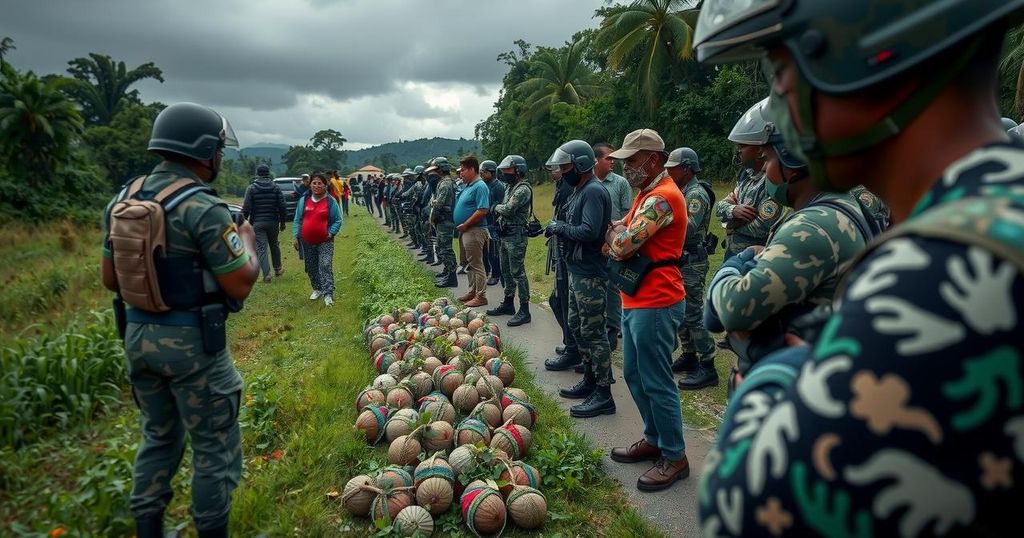Tragic Shooting of Migrants by Mexican Troops Raises Urgent Calls for Reform

Mexican army troops opened fire on a migrant truck, leading to the deaths of six individuals from Egypt, Peru, and Honduras. President Claudia Sheinbaum condemned the incident as “deplorable,” and investigations are ongoing concerning the two soldiers involved. This event highlights persistent issues related to the treatment of migrants and the role of military forces in law enforcement, raising concerns over human rights violations.
MEXICO CITY (AP) — In a tragic incident near the Guatemalan border, Mexican army troops opened fire on a truck filled with migrants, resulting in the death of six individuals from Egypt, Peru, and Honduras. This event, condemned by President Claudia Sheinbaum as “deplorable,” marks one of the most severe instances of violence against migrants by authorities in Mexico since a similar incident in 2021. While three victims were confirmed from Egypt and one from Peru, the nationality of one deceased individual is still unidentified. Additionally, ten migrants sustained injuries, with reports indicating that at least one victim may have been a minor.
The circumstances surrounding the shooting are under investigation, and civilian prosecutors have begun questioning the two soldiers involved, although charges have yet to be filed. This shooting is reminiscent of past offenses where authorities claimed they were responding to threats from migrants. The Defense Department stated that their initial action stemmed from concerns about their safety after the migrants allegedly disobeyed orders to halt. Reactions from Peru’s Foreign Ministry demand an urgent examination of the incident amid a backdrop of strained diplomatic relations with Mexico.
Notably, the area around Tapachula, Chiapas, is notorious for the smuggling of migrants and is often the battleground for drug cartel conflicts. Critics of the military’s role in migration control argue that such incidents are indicative of a broader problem, suggesting that army forces should not possess extraordinary powers in policing civilian matters. Activists and church leaders label this incident a “disproportionate use of lethal force,” highlighting systemic issues in the treatment of migrants in Mexico. President Sheinbaum’s commitment to enhancing military capabilities raises concerns regarding potential abuses of power against vulnerable populations.
The tragic outcome of this shooting underscores the pressing need for reform in how migrants are treated by authorities in Mexico. The conflicting narratives of being under fire or merely attempting to manage migrants complicate accountability. As authorities undertake investigations, there is a dire urgency to ensure that such horrifying events are not repeated, thus safeguarding the rights and lives of migrants.
The event occurs within a complex socio-political landscape where migrant smuggling has transformed into a lucrative business for criminal organizations in Mexico, surpassing traditional drug trafficking in profit margins. The involvement of military personnel in civilian law enforcement, an increasingly common practice, raises critical questions about the use of force and adherence to human rights. Previous incidents of violence against migrants have led to international outcry, highlighting the Mexican government’s difficulty in implementing effective reforms. The relationship between local authorities, military forces, and migrant populations remains fraught with tension, exacerbating the risk of such incidents occurring. The economic plight and dangerous conditions prompting migration add layers to the existing challenges.
In conclusion, the tragic shooting near the Guatemalan border represents a significant failure in protecting vulnerable migrant populations by military and law enforcement agencies. As investigations proceed, the incident draws attention to systemic issues of accountability, the use of force by military personnel in civilian contexts, and the broader implications for human rights in Mexico. It remains imperative for governmental authorities to address these violent occurrences and implement safeguards that prioritize the safety and dignity of all individuals, particularly those seeking refuge from conflict and hardship.
Original Source: apnews.com







